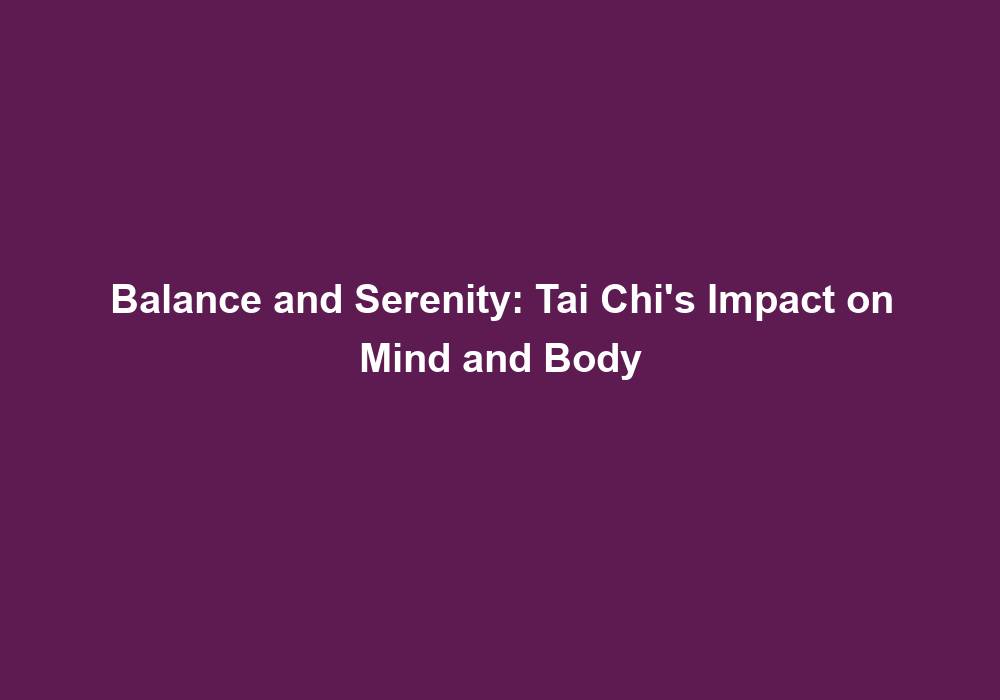Balance and Serenity: Tai Chi’s Impact on Mind and Body
Tai Chi, often referred to as meditation in motion, is an ancient Chinese martial art that has been practiced for centuries. With its gentle and flowing movements, Tai Chi combines elements of meditation, relaxation, and physical exercise, making it a powerful practice for achieving balance, serenity, and overall well-being. In this article, we will explore the profound impact that Tai Chi has on the mind and body.
The Origins and Philosophy of Tai Chi
Tai Chi originated in ancient China and is deeply rooted in Taoist philosophy. It was initially developed as a martial art but has evolved into a popular form of exercise and meditation. The philosophical principles behind Tai Chi emphasize the harmony of Yin and Yang, the interconnectedness of body and mind, and the flow of Qi (life energy) throughout the body.
The practice of Tai Chi focuses on the integration of mind and body, using slow and deliberate movements to cultivate inner strength and balance. By cultivating an awareness of the body’s movements and breath, practitioners can develop a sense of mindfulness and presence, fostering a deeper connection between the mind and body.
The Physical Benefits of Tai Chi
-
Improves Balance: One of the most notable benefits of practicing Tai Chi is its ability to improve balance. The slow and controlled movements of Tai Chi help to strengthen the muscles responsible for maintaining balance, reducing the risk of falls, especially in older adults. The practice of shifting weight from one leg to the other, combined with the gentle bending and stretching of the knees, helps to improve stability and coordination.
-
Enhances Flexibility: Tai Chi involves gentle stretching and flowing movements, which gradually increase flexibility and range of motion. Regular practice can help improve joint function and prevent stiffness. The slow and controlled nature of the movements allows for a deep stretch without putting excessive strain on the joints, making it suitable for people of all ages and fitness levels.
-
Strengthens Muscles: Despite its gentle appearance, Tai Chi is a weight-bearing exercise that engages multiple muscle groups. The constant shifting of body weight and the control required in each movement help to build muscle strength and endurance over time. The slow and controlled nature of the practice allows for a focused effort on engaging specific muscle groups, leading to increased strength and toning throughout the body.
-
Boosts Cardiovascular Health: While Tai Chi is not a high-intensity aerobic exercise, it still offers cardiovascular benefits. The slow and deliberate movements increase heart rate and blood circulation, promoting cardiovascular health and improving overall fitness levels. The deep breathing techniques incorporated into Tai Chi also help to increase oxygen intake and improve lung capacity.
-
Promotes Better Posture: Tai Chi emphasizes proper body alignment and posture, leading to improved posture and body awareness. Regular practice can help alleviate back pain and tension caused by poor posture. The slow and controlled movements of Tai Chi encourage a natural alignment of the spine, promoting a strong and flexible back, and reducing the strain on the neck and shoulders.
The Mental and Emotional Benefits of Tai Chi
-
Reduces Stress and Anxiety: Tai Chi is often described as a moving meditation, as it requires focused attention and deep breathing. This combination helps to calm the mind, reduce stress levels, and alleviate symptoms of anxiety. The slow and rhythmic movements help to shift the focus away from the stressors of daily life and promote a sense of relaxation and inner peace.
-
Increases Mindfulness: The slow and deliberate movements of Tai Chi promote mindfulness, allowing practitioners to stay fully present in the moment. This heightened awareness can help improve concentration and focus in daily life. By focusing on the sensations of the body and the breath, practitioners develop a deep sense of mindfulness that can extend beyond the practice itself.
-
Enhances Mood and Emotional Well-being: Regular practice of Tai Chi has been shown to increase the production of endorphins, the body’s natural feel-good hormones. This can help improve mood, reduce feelings of depression, and enhance overall emotional well-being. The meditative nature of Tai Chi also allows for self-reflection and introspection, providing a valuable tool for emotional self-care.
-
Improves Sleep Quality: The mindfulness and relaxation techniques employed in Tai Chi can have a positive impact on sleep quality. By promoting relaxation and reducing stress, it becomes easier to fall asleep, stay asleep, and enjoy a restful night’s sleep. The rhythmic and flowing movements of Tai Chi can help to release physical tension and quiet the mind, creating the ideal conditions for a peaceful night of sleep.
Getting Started with Tai Chi
If you are interested in experiencing the benefits of Tai Chi, here are a few tips to help you get started:
-
Find a Qualified Instructor: It is essential to learn Tai Chi from a qualified instructor who can guide you through the proper techniques and movements. Look for instructors who have been certified by reputable Tai Chi organizations. A qualified instructor can ensure that you are practicing Tai Chi safely and effectively, maximizing the benefits of the practice.
-
Wear Comfortable Clothing: Opt for loose and breathable clothing that allows for a full range of motion. Tai Chi is typically practiced barefoot or in lightweight, flexible shoes. Comfortable clothing and footwear will allow you to move freely and comfortably during your practice.
-
Start with Basic Movements: Begin with basic Tai Chi movements and gradually progress as you become more comfortable. Focus on mastering the fundamentals before moving on to more complex forms. Building a strong foundation in the basic movements will ensure that you have a solid understanding of the principles and techniques of Tai Chi.
-
Practice Regularly: Consistency is key when it comes to reaping the benefits of Tai Chi. Aim for at least 30 minutes of practice, three to four times a week, to experience noticeable improvements in both mind and body. Regular practice allows your body and mind to adapt and develop the necessary skills and strength to progress in your Tai Chi journey.
-
Listen to Your Body: Tai Chi is a gentle and low-impact exercise, but it is still important to listen to your body’s limitations. Modify movements or take breaks as needed to avoid strain or injury. Pay attention to any discomfort or pain during your practice and make adjustments accordingly. Tai Chi should be a nourishing and enjoyable practice for your mind and body.
Conclusion
Tai Chi offers a holistic approach to wellness, benefiting both the mind and body. Its gentle and flowing movements promote balance, flexibility, and strength, while also reducing stress, enhancing mindfulness, and improving emotional well-being. With regular practice, Tai Chi can serve as a powerful tool for achieving inner serenity and optimal health. Embrace the art of Tai Chi, and embark on a journey towards balance and serenity in your own life.
Please note that while I strive to provide accurate and up-to-date information, it is always advisable to consult with a healthcare professional or certified Tai Chi instructor before starting any new exercise or wellness routine.







